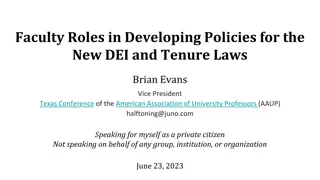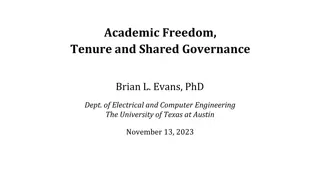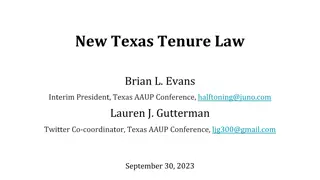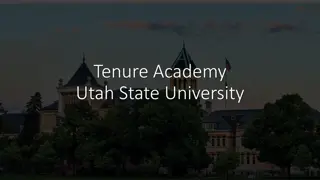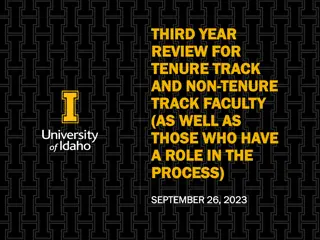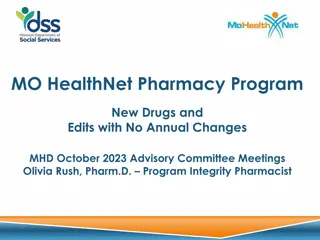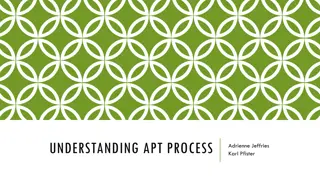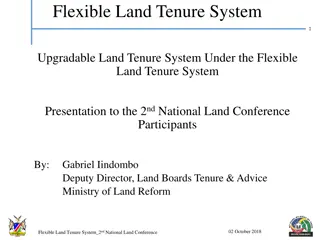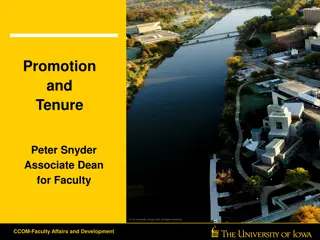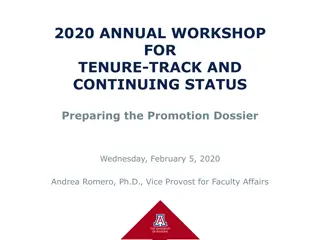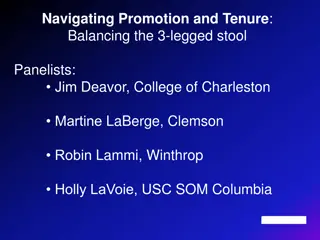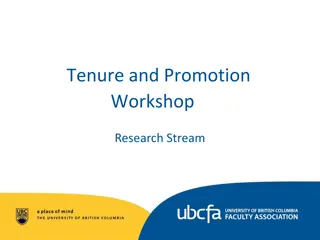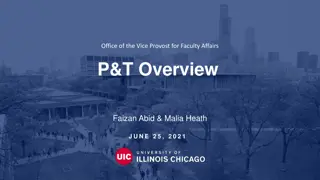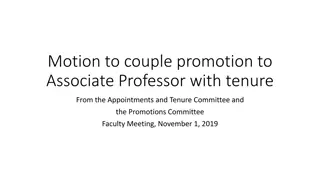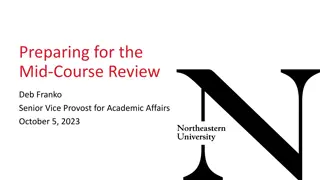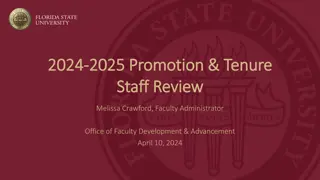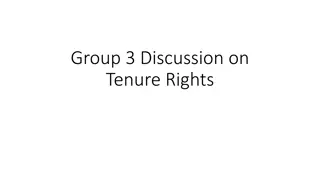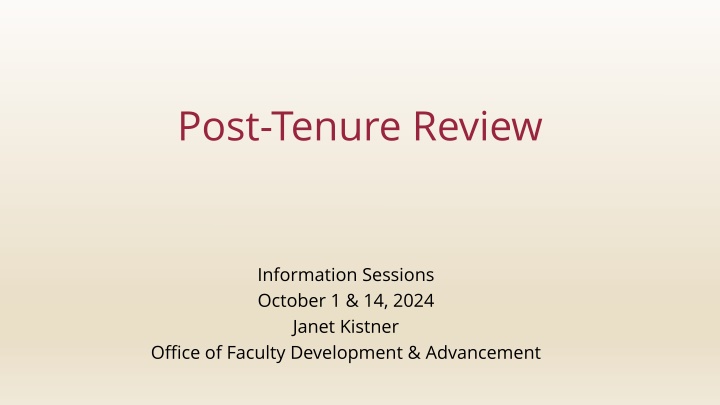
Post-Tenure Review at FSU
Learn about the Post-Tenure Review process at Florida State University, including what it entails, who is reviewed, the current status of the review, the selection process, timeline, and review process details.
Download Presentation

Please find below an Image/Link to download the presentation.
The content on the website is provided AS IS for your information and personal use only. It may not be sold, licensed, or shared on other websites without obtaining consent from the author. If you encounter any issues during the download, it is possible that the publisher has removed the file from their server.
You are allowed to download the files provided on this website for personal or commercial use, subject to the condition that they are used lawfully. All files are the property of their respective owners.
The content on the website is provided AS IS for your information and personal use only. It may not be sold, licensed, or shared on other websites without obtaining consent from the author.
E N D
Presentation Transcript
Post-Tenure Review Information Sessions October 1 & 14, 2024 Janet Kistner Office of Faculty Development & Advancement
What Post-Tenure Review is NOT It is NOT the end of tenure It does NOT change tenure criteria It does NOT change FSU s tenure policies or procedures It is a sustained performance evaluation
Current Status of Post-Tenure Review Statute passed in July 2022 BOG Regulation approved March 2023 FSU Regulation approved June 2023 Bargained with UFF and added to CBA September 2024
Post-Tenure Review Who is reviewed? Tenured faculty beginning 5 years after being awarded tenure (including those hired with tenure) or promoted to Full Professor What is the review period for PTR 2025? 5 calendar years: 2020, 2021, 2022, 2023, 2024 What is reviewed? Faculty performance of assigned duties Substantiated findings resulting in disciplinary action Who are the reviewers? Chairs/Directors Deans Provost
Selection of Faculty for 2025 Post-Tenure Review Faculty awarded tenure or promoted to full in fall 2020 PLUS 20% of faculty tenured/promoted prior to 2019: Randomly selected Volunteers (limited to those who would have been eligible for SPI in 2024/2025)
PTR Timeline September 30 2024: Faculty members participating in 2025 PTR confirmed by the Office of Faculty Development and Advancement. October to December 2024: PTR participants update their CVs in FEAS and prepare their materials for review. January to March 2025: PTR materials are reviewed by department chairs and deans. April to May 2025: Provost review of deans PTR ratings. NOTE: College and departments will establish internal submission deadlines
Review Process: Faculty Role Faculty members submit to their department chair/school director (or dean, for colleges without departments/schools) the following materials: 1. FEAS Post-Tenure Review Report (includes CV, AOR, SPCI and grade distribution for the review period). 2. Summary of Accomplishments during the review period (1-page limit; required). 3. Additional Evidence of Performance during the review period (3-page limit; optional). 4. Opportunity to review materials and provide a response.
Review Process: Chair/Director Role Chair adds to the review materials following information for submission to the dean: 1. Evaluations for the review period. 2. Inclusion of any disciplinary reports during the review period. 3. Letter assessing the faculty member s performance (with input from a faculty committee).
Review Process: Dean & Provost Roles Dean submits to the Provost a letter assessing each faculty member s performance for the review period (may include input from a college committee) and a recommended rating. Provost assigns to each faculty member a rating, in consultation with the president (may include input from an advisory committee).
Performance Ratings Exceeds Expectations: a clear and significant level of accomplishment beyond the average performance of faculty across the faculty member s discipline and unit. Evidence of awards, honors, and other criteria recognized by academic units as meritorious performance is expected for assigning this rating. Meets Expectations: expected level of accomplishment compared to faculty across the faculty member s discipline and unit. Does Not Meet Expectations: performance falls below the normal range of annual variation in performance compared to faculty across the faculty member s discipline and unit but is capable of improvement. Unsatisfactory: failure to meet expectations that reflect disregard or failure to follow previous advice or other efforts to provide correction or assistance, or performance that involves incompetence or misconduct, as defined by applicable university regulation and policies. Evidence of prior feedback of performance problems with an opportunity to remediate performance problems is expected for assigning this rating.
Outcomes of Ratings Exceeds Expectations or Meets Expectations : monetary reward that may consist of a salary increase, one-time bonus, or both. Does Not Meet Expectations : placed on a Performance Improvement Plan (PIP), given 12 months to meet goals or proceed to proposal to terminate. Unsatisfactory : proposal to terminate employment, pursuant to applicable University processes. Outcomes from the Post-Tenure Review process may be appealed pursuant via the applicable collective bargaining agreement (CBA) or to the Faculty Senate Grievance Committee.

